- Home
- Dirk Patton
SNAFU: Resurrection Page 2
SNAFU: Resurrection Read online
Page 2
The shame of it nested in his breast, as bitter and twisted as the scrubby trees that grew in this cursed marsh.
Another sling-stone rattled through the brush just off to their left.
“They’re toying with us,” Otho said.
“Leave me.” They were the first words Lamiskos had spoken since before the battle. The resignation in the Tarantine’s voice broke something in Quintus – a barricade that held back the whole of his helpless fury.
“We fight together or not at all.” He nodded to where the gnarled trees thickened a few dozen paces ahead. “Right there.”
“Sir?” Otho asked.
Quintus smiled for the first time in what felt like days. “There is where these bastards learn their mistake.”
* * *
Lamiskos moaned again, a pitiful sound that raised the hairs on Quintus’s arms. They’d propped the wounded legionnaire against one of the trees, sword in hand, their single remaining shield laid over him like a blanket. Quintus hoped the Germans would prefer to finish off the Tarantine by hand, but he left the shield to ward any remaining sling stones. The rest of the squad lay amidst the sodden shadows, half-buried in slushy mess the rain had made of the forest floor – faces, armor, and clothes smeared with muck. A fat-bodied spider tickled across the back of Quintus' hand, but he did not move, even when the thing paused to deliver a stinging bite to the webbing of his thumb.
If he and his comrades were spotted, the Germans would send them to Hades.
The barbarians entered the tree line slowly, weapons out, eyes wide in their mud-spattered faces. They fanned out to scan the forest, advancing more confidently when it became clear the Romans had abandoned their wounded comrade. One of them barked something in their hard-edged tongue and the others laughed.
Quintus waited in the cold mud as his prey crept closer. The muck was in his hair and clothes, the chill seeming to sink into his very bones. He clenched his jaw to stop his teeth chattering.
A tall German with a longsword crept warily toward Lamiskos. He prodded the Tarantine with his blade, and Lamiskos swept it aside, cursing the barbarian for a coward.
The German snorted, then called something back to his comrades. More laughter rang throughout the forest. A few more barbarians entered the trees, weapons raised, but when no one descended on them, they straightened, relaxing.
The tall man, the leader apparently, said something to his companions, then gestured with his sword. Two of the barbarians moved further into the wood, looking for signs of the Romans. Quintus hoped Ceorix had been able to leave a clear enough trail for them to follow.
The leader poked at Lamiskos again, then turned to discuss something with his five remaining comrades.
When the man glanced away, Quintus finally struck.
Rising from the mud like an avenging revenant, Quintus lunged with his gladius, slashing for the vein on the barbarian chieftain’s inner thigh. The blade bit deep, the spray of blood speckling Quintus as the man fell shrieking to the mud. Turning, he leveled a hard kick at the groin of the barbarian closest to the writhing chieftain, then drove his blade into the man’s throat as he hunched forward.
Otho burst from the muck on the other side of the startled barbarians, deftly gutting one of the Germans with his gladius then turned to bury blade of his entrenching pick into the neck of another. Even Lamiskos did his part, hurling his gladius overhand at one of the barbarians. It was a bad throw, the handle of the blade striking the man’s shoulder, but the impact distracted him enough for Quintus to slip the blade of his dagger between the barbarian’s ribs.
One of the two remaining Germans tackled him. White sparks danced across Quintus’s vision as his head rebounded from a tree root. By the time his sight cleared the barbarian was on top of him, pushing his face into the mud. Quintus’s sword arm was pinned below him, his dagger scraping uselessly across the barbarian’s chain shirt. He bucked and twisted, but the man might have been a boulder for all Quintus could do to move him.
Mud filled Quintus’s eyes, nose, and mouth, smothering him. He struggled to raise his head, to breathe, but the barbarian bore down with almost inhuman strength. The world became nothing more than a cold damp pit as the swamp closed over Quintus. His struggles slowed, his thoughts slipping away.
Dimly, Quintus felt the man on top of him jerk, then suddenly the pressure lifted. Strong hands grabbed his shoulders, dragging him up into the air. Quintus took a greedy breath, then gagged as mud filled his throat. Gasping, he clawed it away, coughing as he fell back against the tree.
“Thought he almost had you, sir.” Otho’s grinning face bobbed into view. He brandished his bloody pick.
Quintus stifled a laugh. He could feel it – the mixture of joy and relief that always came after a fight. Against all odds, he had survived again. He tamped the feeling down. “Everyone up, there are at two more barbarians ahead of—”
“I wouldn’t worry about them.” Ceorix stalked from the trees at the far side of the clearing. With a thin-lipped frown he made a show of wiping the blade of his long dagger on the leaves of a nearby tree. “Looks like you cleaned this lot up nicely.”
Otho slapped his chest with the flat of his gladius. “Lucky for you lot, I’m the best fighter in the legion.”
“Debatable.” Ceorix knelt to slit the throat of a writhing barbarian.
The big man chuckled. “Care to wager on that, cupid?”
Yesterday, the joke would’ve brought a round of laughter from the squad. Now, they simply looked to the ground, silent and uncomfortable.
“Do you think there are more Germans?” Lamiskos’ question came as a pained whisper, his breathing sharp and quick.
“Always.” Ceorix sheathed his knife.
“I want to put more distance between us and the battle.” Quintus pushed to his feet, nodding to Ceorix. “Which way to Aliso?”
The Gallic hunter squinted up at the flat, grey sky. After a long moment, he spat, then thrust his chin at a sharp angle to the direction they had been heading. “That way, near as I can tell.” Ceorix scratched the back of his neck, heavy brows knitted above his shadowed eyes. “They will have put out pickets to catch any survivors making for the river. It’s what I’d do.”
“Leave me.” Sweat stood out on the Tarantine infantryman's brow, his lips pressed together in a pained scowl, jaw clenched with the effort of pulling himself upright.
Quintus waved a hand to silence the man. “We fight together or not at all. Is that clear?”
“Never any question, sir,” Otho said.
“I’ll make sure to burn offerings to your good fortune when we get back to Rome,” Lamiskos said through pain-gritted teeth.
Grinning, Otho bent to help Lamiskos to his feet. “Better yet, pay for dinner and drinks.”
“My friend,” Lamiskos gave a weak laugh. “If we get out of this, I’ll buy you a damn tavern.”
* * *
“Sir,” Ceorix hissed from where the trees thinned further ahead. “You’re going to want to see this.”
Not wanting to risk a camp, they’d been walking for the better part of evening, stopping only to share a hurried dinner of dried meat and to bind Lamiskos’s wound. The darkness left them poking the swampy ground with a stick to keep from stumbling into a mire, but gradually scrubby trees gave way to pine and larch even as the earth became more firm.
Around midnight, the gods had finally answered Quintus’s whispered prayers – the rain had ceased, clouds shifting to reveal a gibbous moon, its wan light enough to pick out trees and rocks. For a moment Quintus almost believed they might survive.
He should’ve known better.
“In Jupiter’s name, what is it?” Lamiskos’s voice broke like a man on the edge of panic.
Quintus stepped into the clearing to gaze up at the massive wooden structure. The scaffold was as tall as the Arch of Augustus and nearly twice as broad. Roughly man-shaped, it was a thing of salt-bleached wood hung with bones and ragged bits of cloth.
No… not cloth, Quintus realized with horror – tanned skins. The odd structure hunched forward like a man on the verge of collapse, its limbs at odd angles, arms and legs twisted by too many joints. Strips of braided sinew bound the scaffold together, the pale wood appearing like bones in the moonlight. Skulls lined the top, a jumble of animal and human remains that lent the structure a low, brooding aspect, as if it were a titan prepared to snatch them up.
Runes were carved into every exposed surface. The strange, curling sigils looked nothing like the Germanic script he had seen etched into stones and trees. They seemed to crawl across the wood like insects as the squad crept towards the thing, shifting in a way that made Quintus feel as if he were trying to focus on a heat mirage.
“Is it a shrine?” Lamiskos asked, glancing at Ceorix.
The Gaul sucked his teeth for a moment, then winced. “Not sure.”
“You’re a barbarian.” Otho mimed stroking a beard. “Surely you must recognize something.”
“What do you know of Egyptian tombs?” Ceorix grunted. “I’m a Gaul, idiot. My people are no more German than yours.”
The big legionnaire scowled but held his tongue.
Quintus squinted up into the vast, open interior of the scaffold. It was hung with what looked to be twists of grass and sticks, but on closer inspection proved to be the desiccated bodies of thousands upon thousands of insects. He took a surprised step back, grasping the structure for support, then yelped and snatched his hand back.
It was warm to the touch. Not the stolid sameness of wood or cloth, but genuinely warm, like the body of a living man.
Bile rose in the back of Quintus’s throat as he prodded the structure with his sword. He almost expected it to bleed as he tentatively carved into the strut, but the strip just curled away like normal.
The breeze picked up suddenly, causing the dead insects to rasp and rustle as they brushed against one another. Wind blew through the hollowed skulls atop the scaffold, the sound like a storm shrieking around the edges of a door. For a moment, Quintus thought the scaffold might come to life, tearing free of the moss and vines to stand like some colossus of legend, but the wind died as suddenly as it started, and with it, the high, skirling moan.
“Can you read any of this?” Quintus glanced back at Ceorix, then thrust his chin at the runes.
The Gaul padded forward to examine the rough sigils then drew back with a low hiss as if the writing was an adder about to strike.
“It’s not Gallic,” he said, his wary gaze fixed upon the runes. “Or German.”
“That makes no sense.” Lamiskos glanced around. “Isn’t this Cherusci territory?”
“It is.” Ceorix’s voice trembled. “But this is no human tongue.”
“Sir,” Otho hissed. “Someone is coming.”
Quintus glanced back, cursing as he saw the dim glow filtering through the trees. He cocked his head, trying to judge the distance, but the pines muffled the footfalls of the approaching party. From the light, he guessed it to be a large group.
Quintus and the others padded back to the tree line, bodies low to cast smaller shadows in the moonlight. Unfortunately, the ground around the scaffold was flat and open, the spreading pines having left almost no cover apart from a few bushes choked by a smothering carpet of pine needles.
The torches had drawn much nearer, enough that Quintus could see individual shadows through the trees. Close enough they would notice if Quintus and his comrades fled.
A breeze whispered through the pines, thick limbs swaying with a soft hiss. The sound tugged at Quintus. He glanced up, the beginnings of an idea tickling at the back of his mind.
“The trees,” he whispered to the others. “We climb.”
“What about Lamiskos?” Otho asked.
“I’m wounded, not invalid.” The Tarantine infantryman pushed free of the big man’s grip, then stumbled over to a nearby tree. With a pained groan, he hauled himself into the lower branches, his bandaged leg dragging stiffly behind.
“You heard the man.” Quintus nodded at the pines. “Up. And be quick about it.”
Quintus leapt to catch a branch, grunting softly as he pulled himself up. Thankfully, the limbs were closely spaced. With a bit of effort, he managed to shinny up to where the branches were thickest. Although he couldn’t see his comrades, the occasional grumbled curse from below told him they were making good progress.
After a few shaky moments, Ceorix clambered into the branches across from Quintus, Otho helping Lamiskos to brace himself against the trunk below.
They waited, silent and still, as the procession approached the scaffold.
Torchlight cast the clearing in shadowed relief. The first barbarian to step into view was armed and dressed as a Roman officer, the high crest of his helm gone lank and wet.
Even without the uniform, Quintus would’ve recognized Arminius.
The traitor general was followed by a score of men and women swathed in hide cloaks, gold and silver bracelets clattering on their well-muscled arms. From their weapons and armor it was clear they were chieftains. Quintus recognized some of their attire from the battle and, from the way they eyed one another and kept their hands close to their weapons, it was clear they hailed from rival tribes.
Behind them came Arminius’s guards – turncoat auxilia. Bearing torches, they led coffles of bedraggled prisoners. The captured Romans shuffled forward, heads down and shoulders rounded. They had been stripped down to their mud-spattered tunics, so Quintus couldn’t tell if there were any of rank.
Beside him, Ceorix drew his bow as the prisoners were forced to their knees before the scaffold, but Quintus laid a hand on his arm. There was nothing they could do against so many.
Arminius raised his arms, holding forth in the halting, hard-edged tongue of his folk. He spoke at length, gesturing both to the scaffold and the assembled chieftains.
“What’s that bastard saying?” Otho whispered to Ceorix.
“He’s blowing air,” the Gaul replied, voice low. “Promises of land, victory, and wealth to those who help him crush the Romans.”
For their part, the German chieftains seemed just as skeptical as Ceorix. One of them, a short woman in white furs, even went so far to spit at the traitor’s feet.
With an irritated scowl, Arminius turned to mutter something to the man next to him in a centurion’s helm. At the officer’s call, the auxilia behind the line drew their gladii.
It happened so quickly Quintus barely had time to register the motion as the auxilia stepped forward and slit the throats of the kneeling prisoners. The captured Romans fell forward, feet drumming on the soft earth as their blood spread below the scaffold.
Fingers of dark red touched the edges of the great creaking structure that seemed to almost vibrate with energy. Threads of shadow crept from the cracks and joints of the scaffold to spread through the pool. Like ink in water, the fingers of darkness spread back to the Roman bodies, which began to twitch and convulse.
Quintus gave a low moan as the corpses split open, bursting like overripe fruit to reveal a seething mass of chitinous bodies. Mandibles clacked and chittered as papery wings unfurled to bear the churning horde aloft. As large as scarab beetles, with clutching legs and long centipede-like bodies, the swarm circled the clearing once, before diving deep into the scaffold.
Something stirred inside. Not the papery rustle of insects, but pale, snuffling things. The trolls did not step so much as tumble from the darkness, their flesh slick with inky effluvium, their limbs wrapped tight around their ungainly bodies. Quintus was closer to the things than at the battle, but he still couldn’t focus on the creatures, his gaze sliding off every time he tried to look at them directly. The clearing filled with the smell of rotten leaves, of earth and old, decaying things.
With a thin-lipped smile, Arminius shifted his gaze at the woman in white furs. She barely had time to draw her blade before the trolls descended on her like crows on a fresh kill. They pulled he chieftain apart, bo
nes cracking in jagged mouths as they rooted around inside her, squabbling over craps of bloodied viscera. The other German chieftains watched the slaughter in sullen silence.
Arminius spoke to them again, his tone short and clipped.
“They’re to gather more prisoners, bring them here. He plans to push for the Rhine,” Ceorix translated. “Any who resist will be given to the trolls.”
At Arminius’s gesture, the chieftains fled, casting anxious glances back at the scaffold and the trolls. Even Arminius’s guards seemed unsettled by the unnatural things. With a snarled command, the traitor general waved them back into the forest, the trolls loping after.
“Now we know how that bastard brought the other tribes to heel,” Lamiskos murmured. “But what do we do about it?”
Quintus let out a shaky breath, chewing on his lip. “We can’t hide forever.”
The squad managed to descend with only a modicum of rustling. Thankfully, the thick blanket of pine needles muffled their footfalls as they crept away.
“Sir,” Ceorix hissed suddenly, his voice low and urgent. “I think I heard something over there.”
Quintus squinted into the dim, predawn light. Pines made jagged shadows in the murk, the ungainly form of the scaffold looming behind like the shrine of some ancient and terrible god. For a moment, he thought he saw movement among the trees – a flash of pale skin, a twist of spidery limbs.
Quintus cursed inwardly, his stomach clenching with dread. Bad fortune clung to them like flies on rotten meat. They were in no shape to face one of Arminius’s trolls. They could die facing the beast or flee and hope to lose it in the forest. Quintus chewed his lip once more, considering. With a start, he realized everyone was looking at him.
“Decanus?” Lamiskos asked.
“Aliso. We must reach Aliso,” Quintus said. “The prefect will know what to do.”

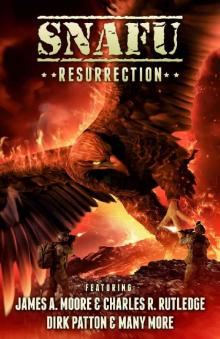 SNAFU: Resurrection
SNAFU: Resurrection The Awakening
The Awakening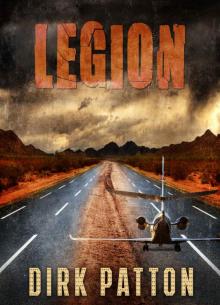 Legion: V Plague Book 19
Legion: V Plague Book 19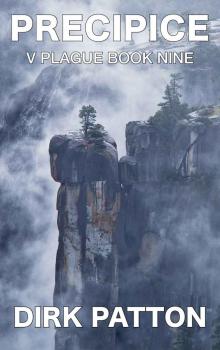 Precipice: V Plague Book 9
Precipice: V Plague Book 9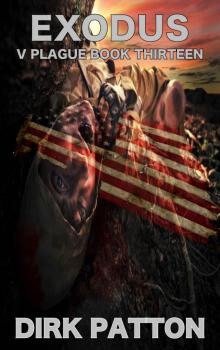 V Plague (Book 13): Exodus
V Plague (Book 13): Exodus Recovery: V Plague Book 8
Recovery: V Plague Book 8 Fractured: V Plague Book 15
Fractured: V Plague Book 15 36: A Novel
36: A Novel Anvil
Anvil Voodoo Plague - 01
Voodoo Plague - 01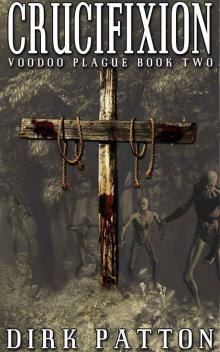 Crucifixion - 02
Crucifixion - 02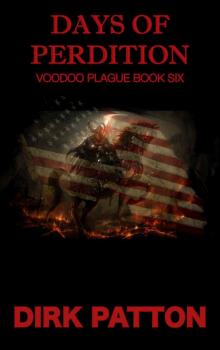 Days Of Perdition: Voodoo Plague Book 6
Days Of Perdition: Voodoo Plague Book 6 Indestructible: V Plague Book 7
Indestructible: V Plague Book 7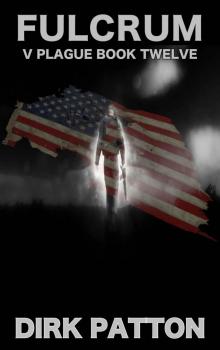 Fulcrum: V Plague Book 12
Fulcrum: V Plague Book 12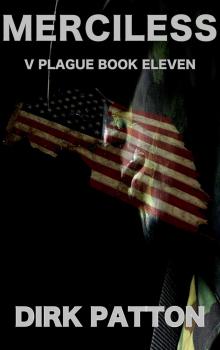 V Plague (Book 11): Merciless
V Plague (Book 11): Merciless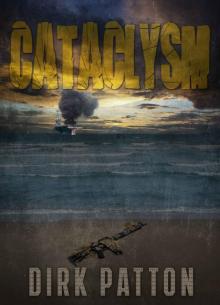 Cataclysm: V Plague Book 18
Cataclysm: V Plague Book 18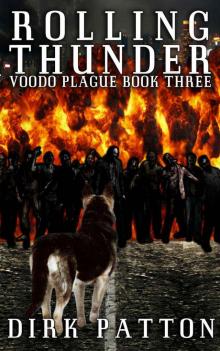 Rolling Thunder - 03
Rolling Thunder - 03 Red Hammer: Voodoo Plague Book 4
Red Hammer: Voodoo Plague Book 4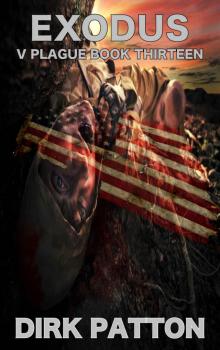 Exodus: V Plague Book 13
Exodus: V Plague Book 13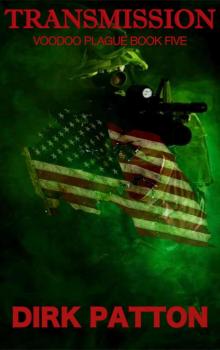 Transmission: Voodoo Plague Book 5
Transmission: Voodoo Plague Book 5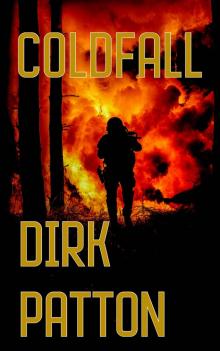 Coldfall
Coldfall Scourge: V Plague Book 14
Scourge: V Plague Book 14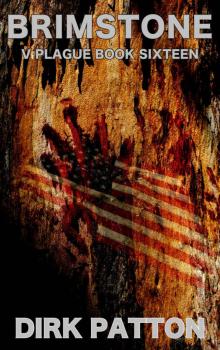 V Plague (Book 16): Brimstone
V Plague (Book 16): Brimstone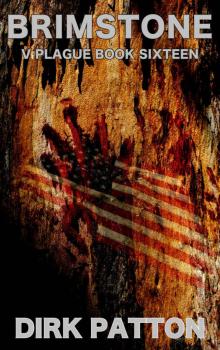 Brimstone: V Plague Book 16
Brimstone: V Plague Book 16